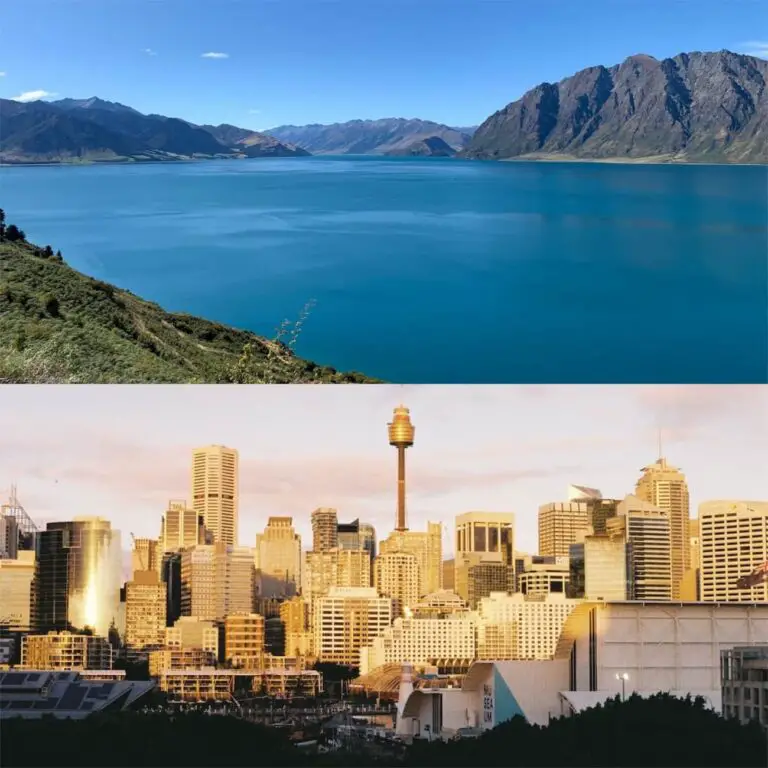Pros and Cons of Living in Dunedin, New Zealand [2024]
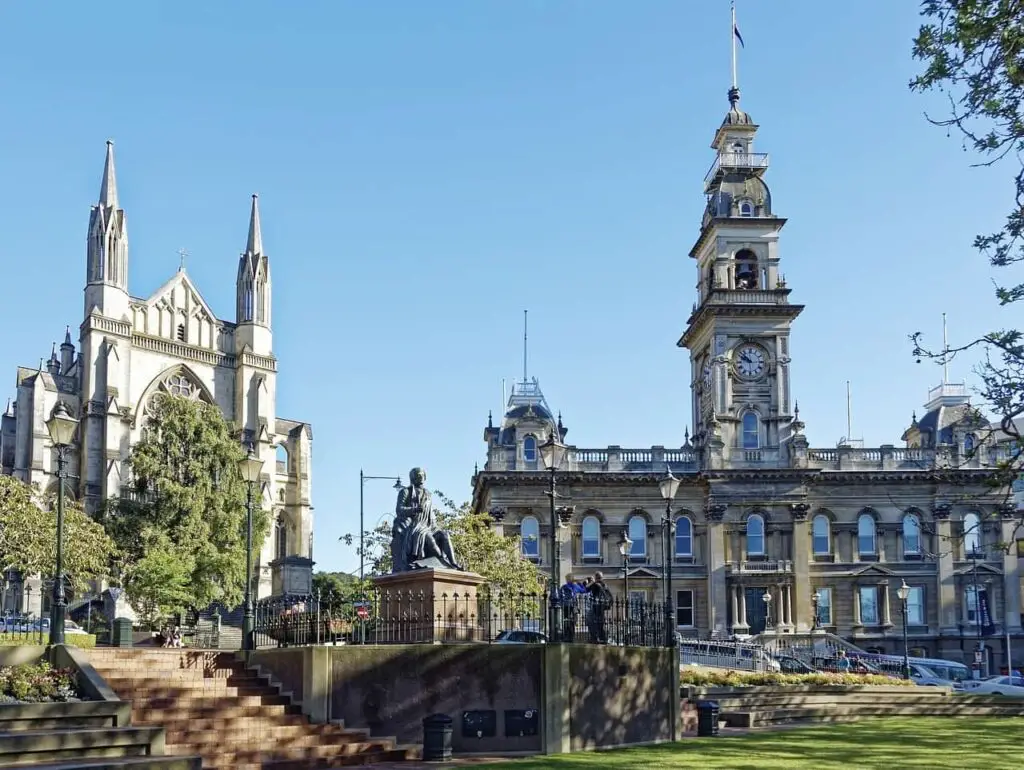
Dunedin is a piece of Scotland in a faraway land of New Zealand. With a population of around 126,000 people, it’s a large enough city to have everything you need for a comfortable living but not large enough to stress you out. Whether you are considering a move or a visit, it’s helpful to know the good and bad sides of Dunedin.
Dunedin is a great place for living if you prefer cooler climates, remote locations, hills, vast and empty beaches, want a slower pace of life, or raise a family. Dunedin isn’t your city if you are looking for a hot climate and vibrant city life. Dunedin offers fewer job opportunities than other cities in New Zealand, like Christchurch or Wellington.
Coastal Dunedin lies on the bottom of the South Island and is the most Scottish city outside Scotland. It was on my list as well. I was considering moving to Dunedin or Christchurch, but the latter has outweighed it just in my case. For you, it might be different. Read till the end to learn all perks and drawbacks of living in Dunedin.
Moving to Dunedin? Learn about Dunedin’s suburbs and the best places to live!
About Dunedin
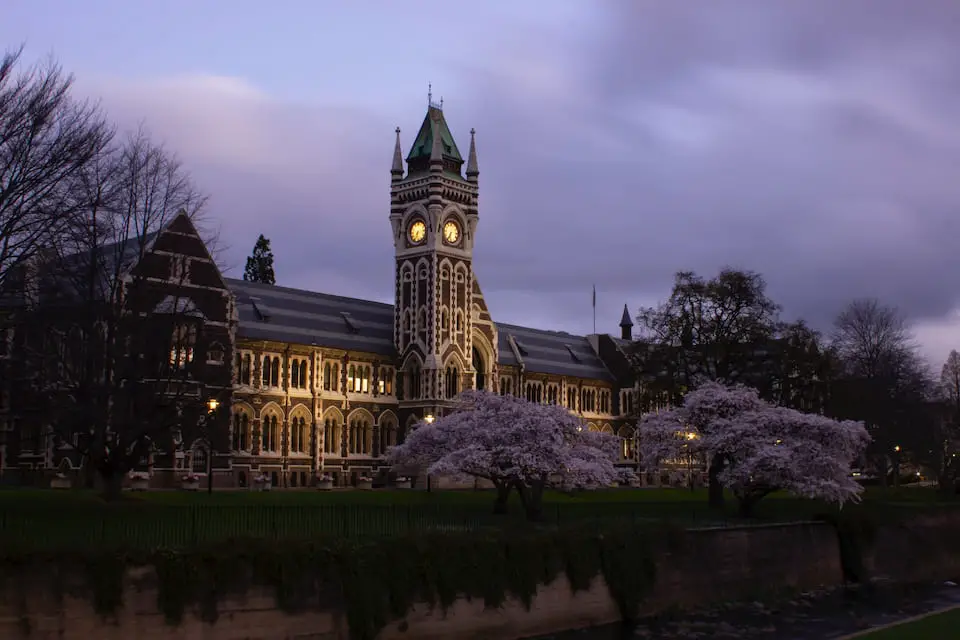
Quick facts about Dunedin:
- Population: 130,000.
- Best suited for: students, professionals in particular industries, home buyers, retirees, and remote living.
- Average rent for a two-bedroom house (on the market): NZ$520 per week.
Dunedin is a middle-sized student city on the east bottom of the South Island. It’s a well-balanced city with job opportunities, study options, affordable house prices, and incredible nature. Generally, Dunedin is great for students and excellent for student life. It has it all, from wildlife and landscape to Kiwi lifestyle – Dunedin is the best choice you can ever make.
Will Dunedin suit your lifestyle? If you like no commuting, no traffic, small-town vibes, peace, hills, and beaches, Dunedin is a great choice. On the other hand, if you like bustling cities, events, energy, and opportunities, you might consider another city.
Dunedin is undoubtedly the most student city in New Zealand. It’s home to the oldest university in the entire country, the University of Otago, and is indeed a student city hosting 25,000 students out of the total population of 126,000.
Adding to everything, if you like exploring and sightseeing, this is the place for you. The only castle in the entire country is present here, and the wildlife in the Otago Peninsula is diverse.
For professionals, there are several job opportunities, mainly in production, healthcare, or farming. At the time of writing, there are 647 jobs listed in Dunedin.
If you’re looking for an affordable family home, Dunedin and the area around is a great place to buy. The city has a very reasonable cost of living and housing (some of the lowest in New Zealand).
Dunedin has some of the country’s most unique, untouched beaches, which are great for surfing. Overall, the Otago Peninsula is just beautiful to explore.
Read our guide on the best cities to live in New Zealand.
Facts about Dunedin population
As of the 2018 census, Dunedin has about 126,255 residents, the median age of which is 36.8 years. From the total number of people residing in Dunedin, only 11,730 are Māori. It’s true; the more South you go, the fewer Māori people you will see.
When it comes to ethnicity, 86.6% belong to the European ethnic group, 9.3% – Māori and 11.0% are Māori descent. The European part of the population has grown by almost 10% since 2006!
About 2.7% of the total number of people in Dunedin have moved from abroad compared to the previous year. That’s about 3,402 newcomers just in 2018! 80% of all Dunedin residents were born in New Zealand, and 20% were born overseas.
Overseas birthplaces are divided as follows:
- 2% from Australia
- 1,1% from Pacific islands
- 6,1% – UK and Ireland
- 1,8% from Europe
- 1,4% from North America
- 5,5% from Asia
- 1,8% from the Middle East and Africa
Moreover, if you are single and looking for your better half in Dunedin, 43% of the total population are single and have never been married. At the same time, 41.3% are married.
But what about typical jobs that people do in Dunedin? Here is some interesting data.
| Profession | % |
|---|---|
| Managers | 13,7% |
| Professionals | 25,7% |
| Technicians and trades | 12,2% |
| Community workers | 11,7% |
| Clerical and administrative workers | 11% |
| Sales workers | 10% |
| Machinery operators and drivers | 5% |
| Labourers | 10,7% |
If you prefer not to commute to your work or study place, Dunedin is a great place as almost 10% walk or job to work and 10,2% work from home. About 40.9% of all school and university students walk or jog to school. Lucky children!
Pros of living in Dunedin
1. Reasonable rents and cost of living
The greatest advantage of living in Dunedin is that you won’t pay huge amounts just for rent. When it comes to the cost of living, New Zealand is pretty much the same everywhere you go. Groceries prices don’t vary by location; however, it’s not true for rents. Here you can see big ranges, and Dunedin is on the lower side, luckily!
According to the 2018 Census, Dunedin”s median weekly rent is $280. Yet, the real-life average rent in Dunedin ranges from $450 to $650, and only a small number of people pay above $650.
Below you can see the average weekly rents in Dunedin. Keep in mind that the data is from 2018.
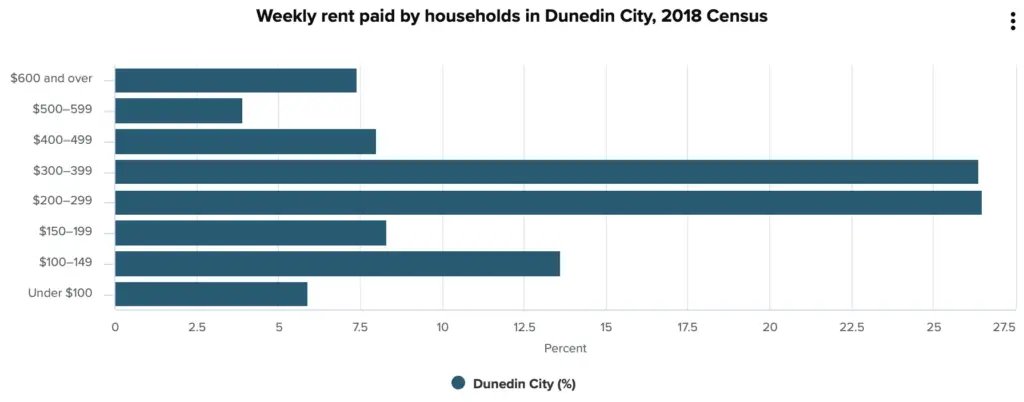
2. Breathtaking and empty beaches
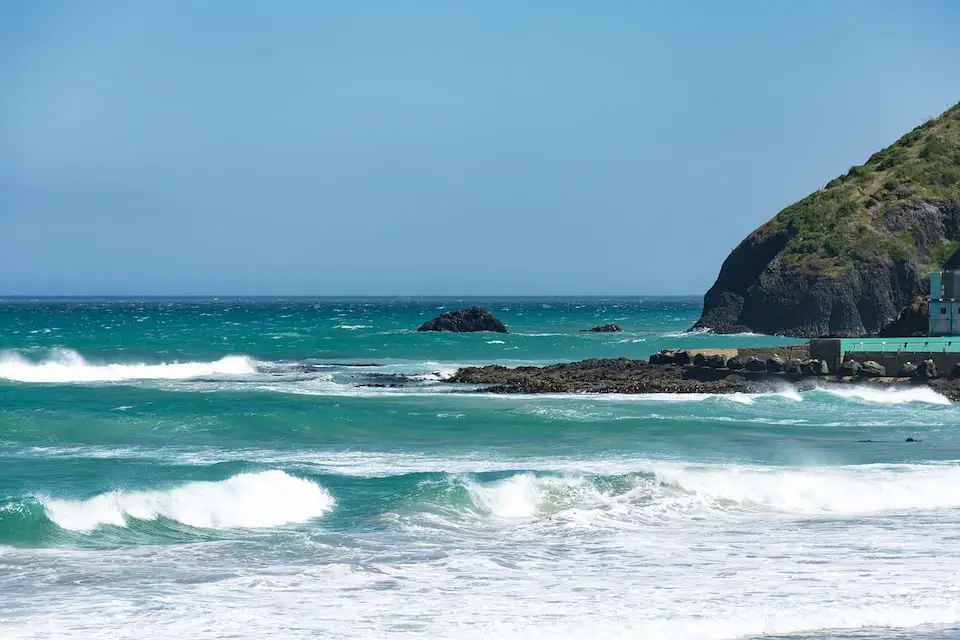
Beaches in Dunedin are different than anywhere else in the country. They are freeing, serene but wild, and, most importantly, empty! Although the weather is often not warm enough to allow you to jump into the water, but you will enjoy walks and just those stunning views!
That said, Dunedin beaches are also great for surfing and other watersports.
Here are some of the best beaches in Dunedin rated by locals:
- Aramoana Beach
- Dunedin Beach
- St Clair Beach
- Warrington Beach
- Tunnel Beach
- Doctor’s Point
- Brighton Beach
- Murdering Bay
- Karitane
- Long Beach
There are over 30 beaches within proximity to the city, so this list continues.
3. Spectacular and serene nature
Dunedin and Otago Peninsula have unique nature and landscapes, which include dramatic cliffs, hills, and wildlife. There are plenty of walks you can take to embrace the beauty of the Peninsula. Check out the DOC website.
Besides, if you want something more spectacular, all attractions of the South Island are at your fingertips.
4. Wildlife next to you
Dunedin is home to rare wildlife. On the Otago Peninsula, you can see unique little blue penguins, yellow-eyed penguins, fur seals, and sea lions. Dunedin’s blue penguin colony is one of the largest in New Zealand.
Here are some of the animals you might come across in Dunedin:
- New Zealand fur seals
- New Zealand sea lions
- Northern royal albatross
- Kiwi
- Tuatara
- South Island kākā
- Takahē
- Dolphins
- Yellow-eyed penguins
You can also visit the breeding colony of the Northern Royal Albatross, which is unique to the Southern Hemisphere.
5. Outdoors and adventure
Dunedin offers access to the outdoors even if you live in the city. There is something for everyone: endless hiking, tramping routes, biking, rock climbing, golf, and various watersports. Surfing is the local’s favorite, thanks to great waves and over 30 beaches in the area.
Just taking a walk is enjoyable; there are many scenic routes. If you have a dog, it’s also an excellent place for dog owners.
6. Pub and cafe scene
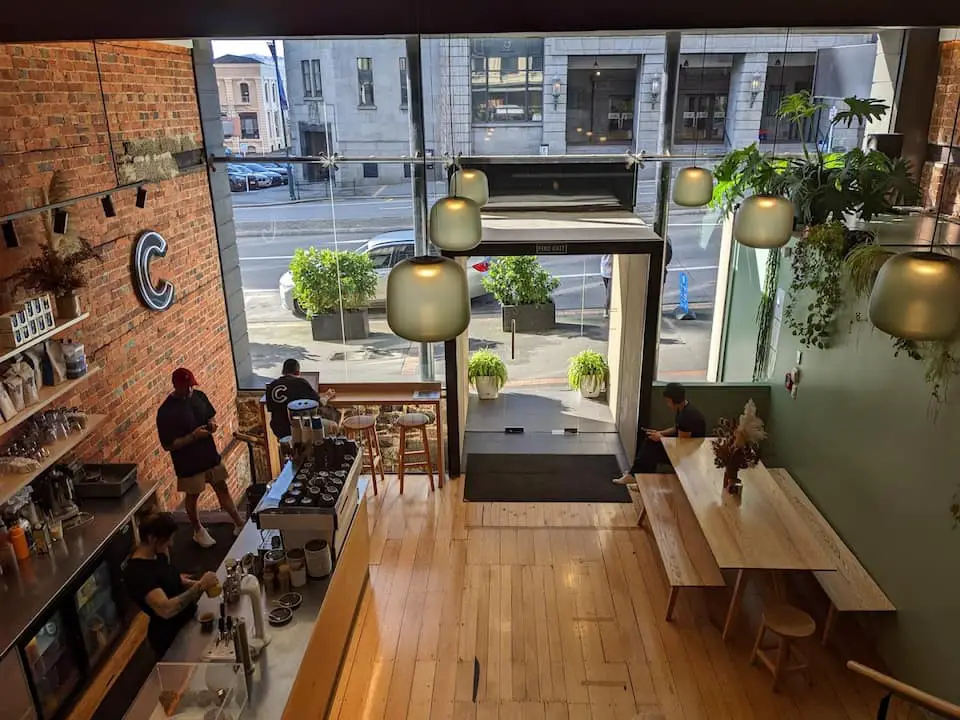
Dunedin is an incredible city for a night out in a pub! Because Dunedin is the most Scottish city in New Zealand, you will find a good amount of pubs to enjoy craft beer at its finest.
Moreover, cafe culture is well-established in the city. As in most parts of New Zealand, you can expect some delightful, premium coffees.
7. A true student town
When in Dunedin, you will feel the student atmosphere right away. The city has the highest population of students considering the number of total residents. Out of 126,255 people living in Dunedin city, there are over 25,000 students. This is thanks to Otago University, the second oldest university in New Zealand.
8. Home to many museums and attractions
Dunedin is one of the best-preserved Victorian and Edwardian cities in the Southern Hemisphere, where you can still be amazed by the heritage of the buildings.
In addition, the city has plenty of museums and other historical sites that are worth visiting, including Dunedin Public Art Gallery and Dunedin Botanic Gardens.
The single castle that exists in New Zealand is located in Dunedin, the Larnach Castle, which is situated about 20 minutes drive from downtown Dunedin. Built in 1871 by William Larnach, Larnach Castle is open all year round.
Also, the steepest street in the world can be found in Dunedin!
9. Various job opportunities
With a population of about 126,255 people, Dunedin is the second-largest city on the South Island and the largest in the Otago region, consequently, it has more jobs than most cities and towns in the South.
In fact, Dunedin is the second largest job market after Christchurch. As of February 2023, there are about 702 jobs available.
Regarding industries, the port of Dunedin provides jobs in logistics. Otherwise, there is a large healthcare sector. Overall, it’s a pretty industrial city with food and beverage processing, construction, and machinery and equipment as the primary industries.
The main business areas in Dunedin are:
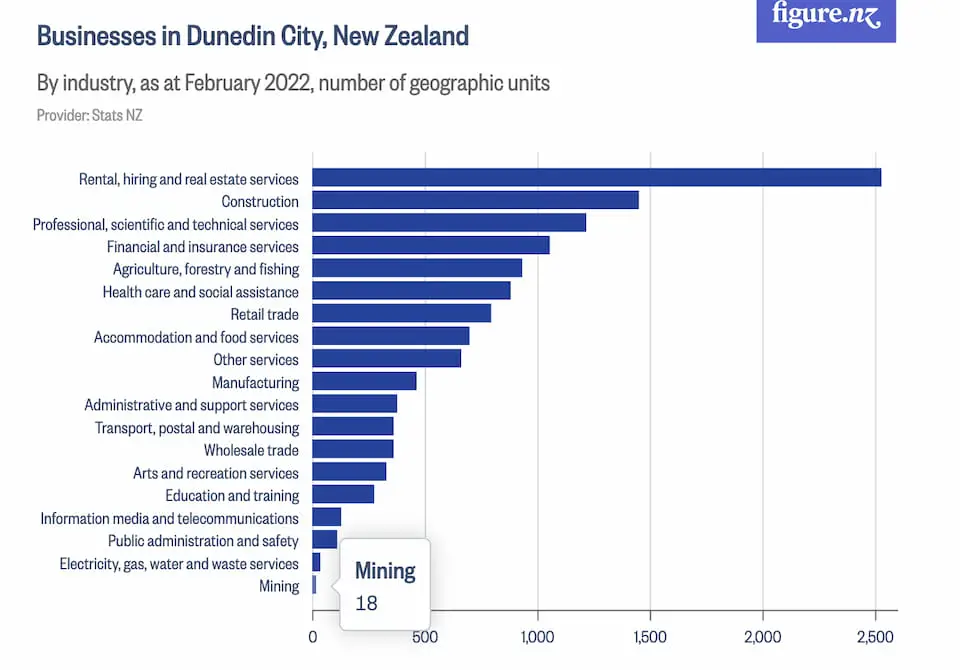
Moreover, some of the major employers of Dunedin include:
- Allied Press Ltd – Newspaper publisher
- Arthur Barnett Limited – Retailer
- Cadbury Confectionary Ltd – Chocolate manufacturers
- Calder Stewart Industries Ltd – Manufacturers and installers of Longrun roofing products
- Delta Utility Services Ltd
- Dunedin City Council
- Dunedin City Holdings Ltd
- Southern District Health Board
- Otago Polytechnic – University
- University of Otago
- Silver Fern Farms Ltd
- Wickliffe Limited – Print and supply chain management solutions
Source: www.enz.org.
The table below shows the percentage of Dunedin residents in each professional category:
| Profession | % |
|---|---|
| Managers | 13,7% |
| Professionals | 25,7% |
| Technicians and trades | 12,2% |
| Community workers | 11,7% |
| Clerical and administrative workers | 11% |
| Sales workers | 10% |
| Machinery operators and drivers | 5% |
| Labourers | 10,7% |
If you are wondering about local wages, average salaries in Dunedin look as follows:
| Operations manager | NZ$48k – NZ$119k | NZ$79,130 |
| Accountant | NZ$43k – NZ$84k | NZ$52,486 |
| General / operations manager | NZ$62k – NZ$132k | NZ$88,983 |
| Software engineer | NZ$48k – NZ$98k | NZ$67,665 |
| Physiotherapist | NZ$49k – NZ$66k | NZ$58,041 |
| Office administrator | NZ$40k – NZ$61k | NZ$51,995 |
| Insurance broker | NZ$51k – NZ$87k | NZ$61,407 |
10. Affordable house prices
Compared to other locations in New Zealand, Dunedin has some of the lowest house prices considering its size and what the city offers. The median sale price in April 2023 was $570,000, which is on the lower end countrywide.
Hence, it’s very realistic to purchase a two or three-bedroom home for around $500,000. Considering that the average house price across New Zealand is $945,568, Dunedin is a goldmine!
That said, the Dunedin property market is developing, and prices are rising. If you are looking for a good deal, check out Invercargill, which is on the bottom of the South Island but on the West side. This city has the lowest house prices that you will come across.
The median rent within the city is only $280 per week. It’s some of the lowest numbers you will come across. Only about 3,5% pay above $500 per week for rent, and 7,4% pay above $600 weekly.
That said, due to the weather and climate of Dunedin, mold is an issue residents often come across. About 10.8% of all homes have serious problems with mold.
In terms of the price of housing and rent costs well, you will love the low prices down there compared to Auckland or Wellington. Dunedin is also cheaper than Christchurch as well in terms of this.
About 54% of all Dunedin residents own a house, that’s not bad!
When it comes to heating, don’t worry, you won’t be freezing in your Dunedin house. 43% of all dwellings have wood burners, 67,8% are equipped with heat pumps, and 49,5% even have an electric heater.
11. The best cheese rolls!
South Island and the bottom of it, in particular Dunedin and Invercargill, are all about their cheese roll! I love them! But unfortunately, the upper north you go, cheese rolls tend to vanish in local cafes.
It’s not clear where exactly cheese rolls were invented, but the first cookbook cheese roll recipe was found in 1951, in Dunedin’s Roslyn Church Jubilee Cookery Book.
Cons of living in Dunedin
1. Lower wages
The median income in Dunedin is only $25,500, according to the census of 2018. Compare it to the national average salary of about $58,000, and you will be shocked! Only 13.5% make over $70,000 per year. This is significantly lower than in other New Zealand cities.
But the average across all age groups is considered, meaning, middle-aged professionals are still making a good living.
In Christchurch, the largest city on the South Island, the median income is $32,900.
In Dunedin, about 8,7% of all workers earn between $40,000 and $50,000 per year. 7,2% have an annual income of between $50,000 and $60,000. 5,6% of all Dunedin residents make between $60,000 and $70,000 per year.
These numbers are comparatively low when you look at New Zealand’s standards and the average wage of $58,000 per year.
2. High costs
While the cost of living is pretty much similar anywhere you go in New Zealand (apart from rents), you might still be surprised by NZ prices.
For instance, a British woman who moved to Dunedin has reported:
“Food shopping is expensive, electricity bills are extortionate in winter, and internal flights are pricey. It costs me more to fly to Christchurch, take in a concert, and stay the weekend than it did for me to fly to Turkey for a week’s summer all-inclusive holiday from the UK.”
Therefore, you need to budget your living expenses carefully so that you don’t need to cut on everything because your pay isn’t high enough.
3. Less developed and looked after city
While Dunedin is considered to be a pretty NZ town, its residents often complain about their city being run down, less developed, managed, and maintained. Some even think that Dunedin needs a good earthquake to improve its infrastructure and the town itself.
Hence, you might find Dunedin to be not as perfect as it could be and discover some lacking points. But don’t they exist in any city?
4. Undeveloped public transport
Public transport is pretty undeveloped in Dunedin, with only about 3,4% commuting using a bus. Dunedin has no trains or trams.
As a consequence, you will be highly reliant on a private car or a taxi, despite the fact that you are living in the city.
5. Weather isn’t the best
Due to its location, Dunedin is one of the coldest cities in New Zealand. Summer is just warm enough, but don’t expect to swim often. For instance, typical summer averages range between 16°C and 23°C.
The city also gets plenty of rain and grey skies. The average number of sunshine per year is 1,683 hours which is considered to be on the lower end for New Zealand. There are many cities with over 2,000 hours of sun.
Dunedin has very cold winters (by New Zealand standards). The temperature ranges from 8°C to 12°C, while in July mean temperature is only 3°C. You will need a good heating system and enough money to afford heating the house.
So, if you are looking for warmer temperatures and more sun, Dunedin isn’t the best choice.

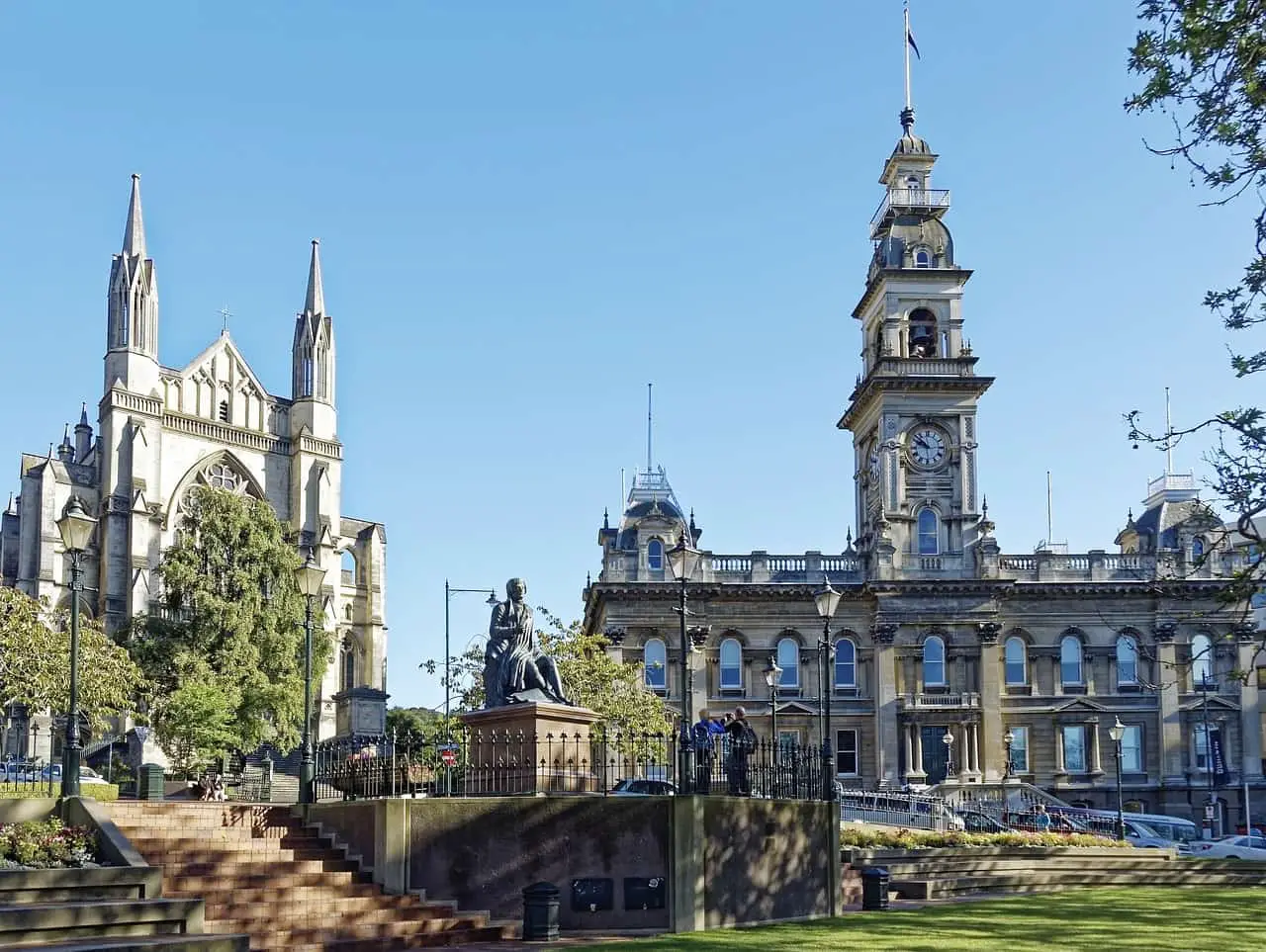
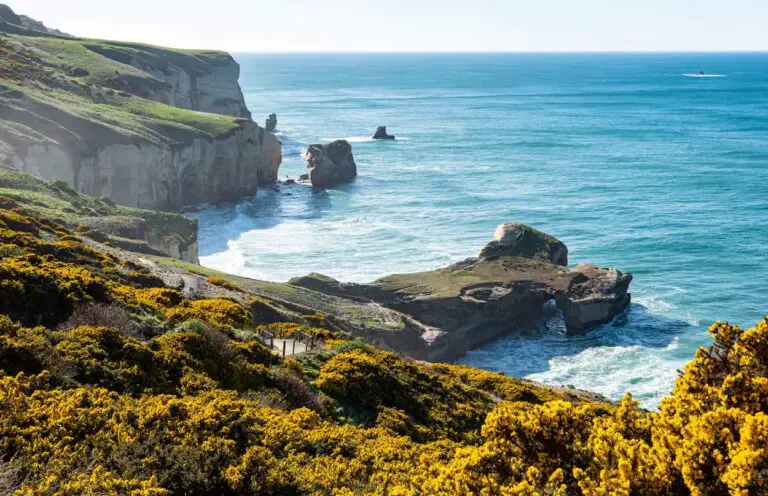
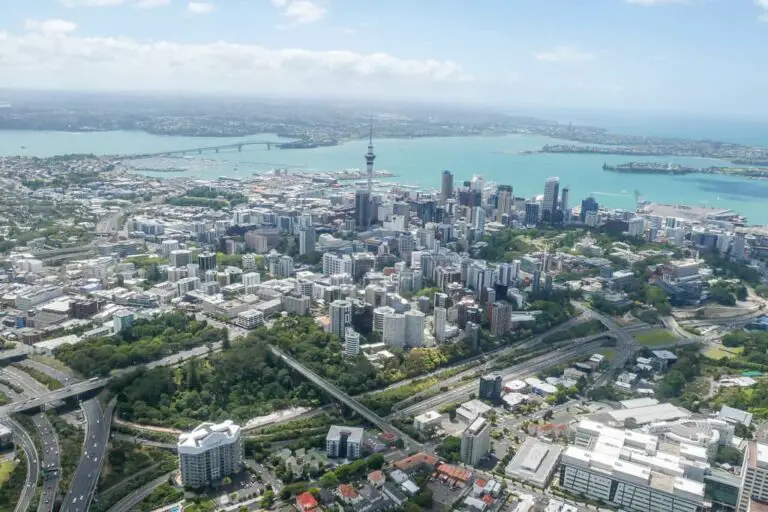
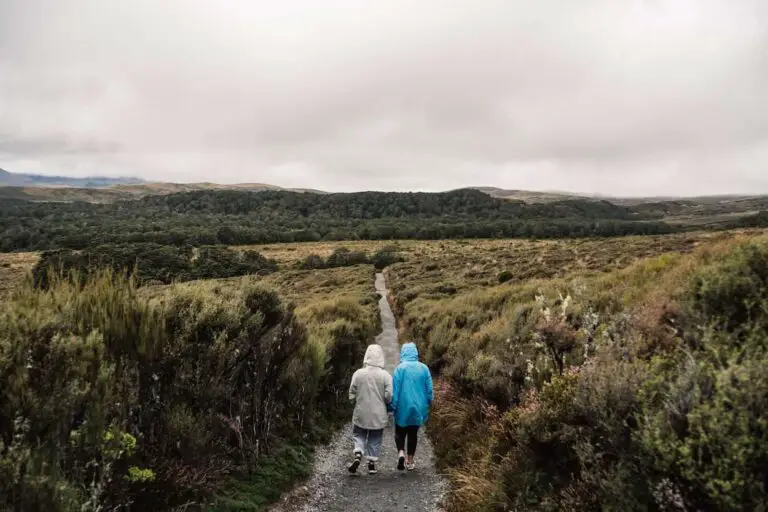
![Guide To Buying Land in New Zealand [2024]](https://simplenewzealand.com/wp-content/uploads/2023/04/IMG_2664-1-768x576.jpg)
![How To Buy a Motorcycle in New Zealand: Ultimate Guide [2024]](https://simplenewzealand.com/wp-content/uploads/2023/04/Depositphotos_39664953_L-1-768x512.jpg)
